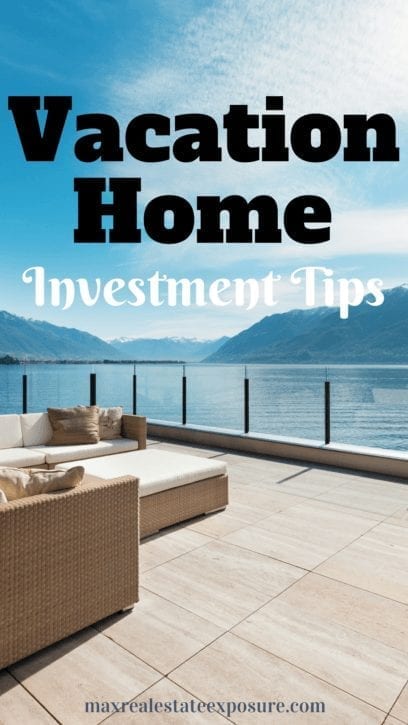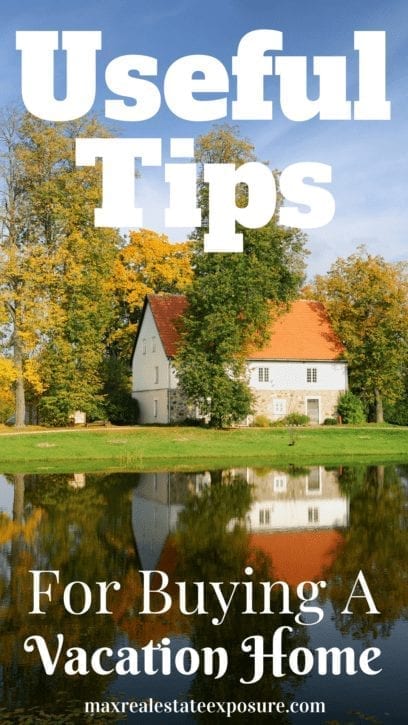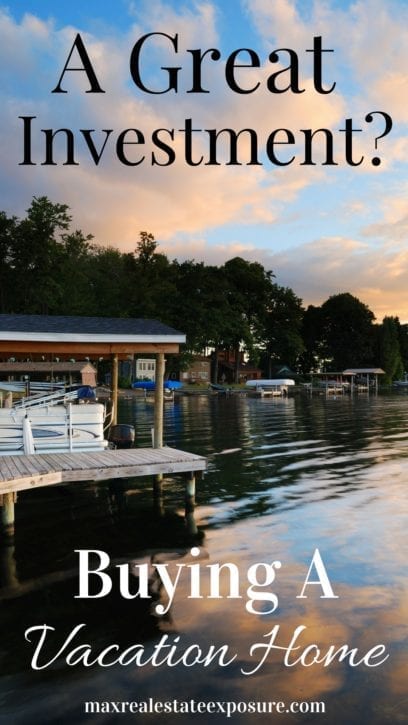 What to Know About Buying a Vacation Home
What to Know About Buying a Vacation Home
Do you want to buy a vacation home?
Buying a vacation home is great for several reasons. Not only does it serve as a great place to spend time away from the world, but it also works as an excellent investment.
There are many reasons to consider investing in buying a vacation home.
Picture this. You’ve been working hard lately. You’re run-down and in need of some relaxation and refreshment.
But instead of having to go through the headache of booking a trip away, you pack a bag and hop in your car. And, just like that, you’re at your own vacation home.
No expensive rentals, no scheduling hassles, just a beautiful getaway in the comfort of your property – set up just the way you like it. Sounds perfect, right?
If this situation sounds idyllic, it’s time to look into purchasing a vacation home. You may be surprised to hear that it’s a smart investment, too!
Want to learn more? Keep reading to determine why a vacation home is a terrific investment for your health, happiness, and wallet.
Plus, we’ll throw in some handy tips on how to find the perfect home away from home for you!
Buying a second home should not be a spur-of-the-moment decision. What to know about investing in a vacation property is not as simple as it seems.
You’ll want it to be one of the best choices you make in your life!
Vacation Home Loans
One of the first things you’ll need to do before buying a vacation home is square away your financing. Understanding how to get a mortgage will be essential. The process you will follow will be the same as a primary residence.
Loans for vacation homes, however, usually are more challenging to get. First, you will need to qualify to carry two mortgages which many people cannot do.
Not only do you need to satisfy the debt-to-income ratio for carrying two loans, but you’ll also need to meet more stringent requirements for a vacation home or investment property loan.
Plan on Higher Interest Rates With Loans For Vacation Homes
Vacation home loans usually have higher interest rates than your primary residence. Some mortgage lenders may also want a higher credit score and a larger down payment to get the best mortgage rates.
For instance, if you’re taking out a conventional loan to finance your primary residence, you can secure down payments as low as 3%.
However, you may need 10 – 20% down for a vacation home. With vacation loans, it’s also essential to remember that renting your vacation property might violate your loan terms. You would want to find out this from the lender upfront.
Investment properties come with higher interest rates than primary or vacation homes. You also may have to put down 20 percent as it is sometimes challenging to get mortgage insurance on investment homes.
Other Mortgage Options For Vacation Homes
You can choose a different route when you want vacation home financing. These options are as follows.
Get a Heloc Loan
Another potential mortgage option for vacation home loans is a Home Equity Line of Credit (HELOC). The HELOC is a versatile revolving line of credit that allows you to draw upon the equity in your property.
A HELOC is similar to a credit card, as it provides an available credit limit and permits withdrawals when needed – just like any other installment-based financial entity!
It is an excellent option when you don’t want to refinance the mortgage on your existing home. You can maintain your current mortgage and access a second (HELOC) loan with differing terms.
Cash Out Refinance of Your Current Home
If you have adequate equity in your property, and it seems prudent to refinance at the prevailing rate, you might be able to raise money for a vacation house by undertaking a cash-out refinance.
A cash-out refinance substitutes your existing mortgage with a new loan for a larger amount and keeps the difference between the two mortgages in cash.
Now that we have covered mortgages for vacation homes, let’s cover why you may want to buy one.
Buying a Vacation Home for Enjoyment: Why It’s Worth It
So, why is a holiday house the perfect place to escape it all? Pretty simple.
You Will Create Memories That Last a Lifetime
Creating lasting memories with your family is essential. And that is precisely what you will do by purchasing a vacation home. Not only will it be another place to call home, but you can also rent it out.
After all, making time for family and friends can be difficult. Between work and tasks around the house, it can even feel impossible.
But if you have a place where you can go with your loved ones, turn off your phones, and spend quality time together, all of that can change. All you have to do is pack your bags and hit the road!
Having a vacation home is a great way to decompress, relax and put the stress of the work week behind you!Click To TweetVacation Homes Are Good for Your Health
Everyone feels great after a fun-filled vacation. But did you know that going on holiday is good for your health?
Some time away from your everyday life will help you reset mentally and physically. In a survey of over four hundred people, ninety-four percent reported feeling more energized after returning from a trip away.
A vacation home investment will give you a safe space to get away from it all and give your body and mind what they deserve- a break!
Buying a Vacation Home is Less Stressful Than Renting
Coordinating everything needed to rent a vacation property can be stressful, especially if more than one family is involved in the trip. But if you already own your place, you can go there anytime that works for you.
That means no dealing with third parties, no strict time schedules, and no surprises. Just pure bliss!
Vacation Home Investment Tips: Why Invest Now?
 We know that vacation homes are perfect for enjoying time with family and friends.
We know that vacation homes are perfect for enjoying time with family and friends.
But what makes them such an excellent real estate investment?
Tax Advantages With Vacation Homes
Did you know that owning a second home can provide you with some significant tax breaks? You can deduct the interest on the mortgage of your vacation home in the same way you do for your primary residence.
You can use second home tax breaks to reduce capital gains when selling.
You Can Rent Vacation Properties to Others
Why not make extra cash off your vacation home while not using it? Renting your house out to others is a great way to do just that.
And because you own this property, how you rent it is entirely up to you. You can offer it up seasonally or year-round if you prefer.
Just be aware that if you decide to rent out your vacation home, it will change the details of your taxes.
So, before you make any decisions, consult your accountant or other tax professionals.
It Can Serve as a Retirement Home
You’re buying a vacation home in a specific area because you love it, right? So why not plan to retire there when the time comes?
Instead of dealing with the hassle of buying a new home when you retire, you’ll already have one you love set up and waiting for you. You will also be able to take advantage of the market’s prices years in advance.
Here are some things to consider when buying a retirement home. Use these tips to make a sound decision with your purchase.
A Friend or Relative Can Live There
If you’re planning to purchase a second home as a real estate investment, it’s often a great idea to let a family member live there as its value appreciates.
For example, if you have a kid going off to college, purchase a vacation property near their school.
That way, they can have a beautiful, comfortable place to live while studying, and once they’re done, you can sell it for a profit.
Buying a Vacation Home Will Diversify Your Investments
Adding a vacation property to your list of investments is a great way to boost your cash flow. After all, it’s always smart not to put all your eggs in one basket.
Many investment markets are fickle, real estate being one of them. By spreading your investments around, you can take advantage of selling the right things at the right times. And it’s never going to be that hard to sell an extraordinary home in a fantastic place for a gorgeous profit!
How to Buy a Vacation Home
 So, we’ve reviewed the benefits of a vacation home investing, but how can you be sure that you’re choosing the right one?
So, we’ve reviewed the benefits of a vacation home investing, but how can you be sure that you’re choosing the right one?
Check out these ten tips to get on the right track when you buy a vacation home.
1. Only Buy A Vacation House in Your Budget
With all the information we access online, there’s no reason to be in the dark about what you can and cannot afford.
Before you buy, calculate an estimation of what your mortgage will be.
Make sure you are smart and realistic about what you can shell out for a down payment. If you have 20 percent, you might want to consider at least that to avoid paying private mortgage insurance (PMI).
Be realistic about what you can afford for monthly mortgage payments.
Even if you plan to rent your new property, don’t count on that when figuring out what you can afford. And remember- it’s okay to start small!
2. Don’t Forget About Added Costs
What do we mean by added costs? We’re talking about home insurance, taxes, utility bills, and maintenance/caretaking costs. When figuring out what’s in your price range, don’t forget to include these in your estimations.
Try to be realistic, even pessimistic, when adding up these costs. If you plan for the worst, then you’ll always be covered.
3. Look For Built Homes Versus Empty Land
Although a custom-built house sounds dreamy, it can be more of a nightmare.
In vacation areas, there can be a lot of restrictions on how you can build your home with numerous restrictive covenants.
For example, sometimes you can’t choose your paint color or add landscaping to your lot. Additionally, it can be challenging to find trustworthy contractors.
In reality, buying a property that already has a house is a better decision. You can make changes without the stress of building from the ground up.
Land loans or construction loans are also more challenging to deal with than conventional home loans.
It’s easier on your wallet and your brain!
4. Steer Clear of Timeshares When You Buy a Vacation Home
Timeshares are finally being outed for what they are cost-ineffective. Not only that, but if and when you decide to sell a timeshare, you may be in for a sour surprise.
Imagine this. You spend over ten thousand dollars on a timeshare. On top of that, yearly maintenance fees are almost one thousand dollars.
You get to spend one week there per year for vacation. Does this sound cost-effective to you?
Of course not! When it comes to vacation home investing, buying vacation real estate is a much smarter move than buying into a timeshare.
First, the money you invest will be for your profit only. And you’ll be able to use the property as much as you want.
On top of all this, caution is advised when selling timeshares. Scammers are running rampant in many areas where timeshares are prevalent.
They collect a fee (which could be over one thousand dollars), saying they have a client interested in buying. After you shell out the cash, you’ll never hear from them again.
Avoid all of these headaches by taking matters into your own hands and investing in your personal property, over which you have complete control.
5. Hire a Local Real Estate Agent When Buying Vacation Homes
You don’t have to feel like you’re on your own when it comes to buying your dream vacation home, especially if you’re looking in an area with which you’re unfamiliar.
Thankfully, a local real estate agent will know all the ins and outs of whichever local community you want. Parking issues? Rental restrictions? They’ll warn you.
Seasonal road closures? You may not have known without the help of an experienced agent! Here are some essential questions to ask when interviewing a real estate agent to work with.
Avoid pesky or downright dangerous surprises by enlisting their expertise. You’ll be glad you did.
6. Location is Critical With Vacation Home Purchases
 Are you planning on buying to rent? Then keep location in mind.
Are you planning on buying to rent? Then keep location in mind.
For example, if you’re looking to buy a lake home, check out lake frontage properties. Because when people are looking to rent lake properties, they want to be right on the lake, not nearby.
Keep other details in mind too. Although a remote vacation may be your ideal week away, most people will want access to modern amenities.
Choosing a property close to shops with WiFi and cellular reception is ideal.
Even though these properties may cost more upfront, they’re also easier to rent out for a higher fee.
Remember- you have to spend money to make money! Here are some tips for buying waterfront property you should know.
7. Consider All Seasons Before Buying
Before you sign the paperwork, visiting your prospective vacation home during all seasons is a great idea if possible.
After all, different areas have unique traits during different seasons.
You’ll want to ensure that your holiday home will get as much use as possible, not just during the summer or winter.
8. Stay Continental For You Investment Purchase
Buying inside the United States is a good idea when purchasing a vacation home. Because although traveling outside of the U.S. is a fantastic experience, purchasing a home in a foreign country can be complicated at best or dangerous.
Also, you will likely get more use out of a vacation home closer to your primary residence.
9. Keep Things Simple by Investing Without Outside Partners
In a perfect world, buying a property with family or friends would be a pleasant, uncomplicated experience that would relieve financial burden and create a warm, shared space.
But unfortunately, when you invest in properties with others, things don’t always go as planned.
Even the most harmonious families can be compelled to disagree and argue regarding joint investments. These fights can start over when to sell, when and who to rent, and sharing time at the property.
The best way to avoid any hostility is to take on a vacation home investment on your own. But, if you think a joint investment is the right decision for you, just be sure to create a specific and detailed contract.
And keep track of expenses, too. When money is involved, some may remember the exact figures differently than others.
10. You Can’t Put a Price on Time Well Spent
Whether it’s a monetary investment, this home is for you. So make sure that you love it.
Put your enjoyment as a number one priority when selecting this property. Remember, you can’t put a price on time well spent!
Pros and Cons of Buying a Vacation House
Let’s recap the pros and cons of a vacation home purchase.
Pros of a Vacation Property
- Vacation homeownership brings the opportunity to have your destination to escape.
- You can make extra cash by renting it when you’re not there.
- It is an investment that will likely appreciate over time.
- It can save you money by having a vacation place without paying for lodging.
- There can be tax benefits for owning a second home.
- It could end up as your retirement home.
Cons of a Vacation Property
- It can be expensive to own a second property, including a mortgage, taxes, and insurance.
- There are maintenance expenses and unexpected costs that pop up.
- It requires time and effort on your part to maintain a second property.
Wrapping Up Buying a Vacation Home
As you can see, buying a vacation home is a great investment for your mind, body, and bank account. So whether you want a holiday house for personal use, monetary gain, or both, don’t hesitate to begin your search.
After all, going on vacation is great for your health. And investing in real estate is an effective way to make some extra cash! Remember to hire a local buyer’s agent when viewing properties and be realistic about your budget.
Once you find that perfect fit, sit back, relax, and enjoy well-deserved time with family and friends because a vacation home is an ideal place to create memories that will last a lifetime.
Additional Helpful Home Buying and Selling Articles
- What is dual agency – see everything you need to know about dual agency and why it’s terrible for buyers and sellers.
- Why open houses work for real estate agents, not sellers – get a detailed overview of why open houses are not necessary to sell a home and put an owner’s property at risk of theft.
- Don’t forget these tax deductions for selling a house – when you sell your house, you’ll want to know what expenses can be deducted from the capital gains tax.
Use these additional resources to make sound buying and selling decisions.
About the author: Buying a vacation home was written by Joy Bender, a co-founder of Aumann Bender & Associates with Pacific Sotheby’s in San Diego.
Her team represents extraordinary homes in various lifestyle categories and price points. Joy helps real estate professionals learn how to create real estate digital marketing to generate leads, learn about breaking into the high end of their market, and about selling to the affluent in her free Facebook Group search: Selling Luxury – Digital Marketing.

